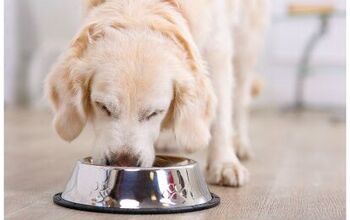Study: Decreased Sperm Count in Dogs Due to Dog Food Chemicals

Researchers at the School of Veterinary Medicine recently released results of 28 years of study of decreased sperm counts in the dogs that were stud Golden Retrievers, Border Collies, Labrador Retrievers, German Shepherds, and Curly Coat Retrievers – and the news is quite alarming.
Between 1988 and 1998, sperm count fell an average of 2.5 percent per year. Thus, by 1998, sperm counts were 25 percent less. Between 2002 and 2014, the sperm count didn’t get any better; in fact, it fell another 1.2 percent per year. That’s another 14.4percent… so now, the number’s at 39.4 percent.
Related: Scientists Propose New Non-Invasive Spay and Neuter Procedure
Decreased Sperm Count in Dogs Led to Other Health Issues
The problem is that once you hit a critical level of decline, health disorders will show up. And that is exactly what the scientists saw with a condition called cryptorchidism. This is a condition where the testes won’t even bother to descend into the scrotum in the newborn puppies. And without testes descending, there can be no future generation.
Other problems seen in the pups included testicular cancer and hypospadias.
BP-A Previously Linked to Decreased Sperm Count
If you follow health news, you may remember that in the late 1990s, there was a lot of bisphenol-A or BP-A in the environment. BP-A is the same chemical found in children’s soft plastic toys and baby pacifiers; and it’s a substance known for its negative effects on the reproductive system. Unfortunately, the effects of BP-A on the body are cumulative – and even a small amount is enough to disrupt reproductive hormones.
Related: Lucy Foundation’s New Grooming Line Supports Mobile Spay/Neuter Van
The same BP-A that is harming babies is now potentially the culprit in what’s harming the dogs and affecting their reproduction.
And it’s no surprise that the scientists found BP-A and other endocrine disruptor hormones in the dog foods, showing a clear possible link to the problem.
The scientists at the University of Nottingham reported that the declining sperm count in dogs and appearance of testicular diseases is most likely not a genetic change but due to the environment.
It’s alarming to see how the chemical age that started between the 1940s and ‘50s has caused destruction. Our environment is full of these endocrine disrupters, and we often willingly accept them. You can find them in laundry detergents, fabric softeners, children’s and pet toys, dish detergents, dry cleaning chemicals, new car plastics, carpeting, and new clothes. Our body’s detoxification systems need extra help to get them out of our body just as our pet’s do, too.
It’s time to get to know these chemicals on a personal level. It’s harming us – and our dogs. The decreased sperm count in dogs is similar to the canary in the coal mine that died when levels of gasses were too high. The canary’s death warned the miners to get out as soon as possible.
Decreased sperm count in dogs may not be a concern that makes the top of your list today if your dog is neutered but what’s happening in the dogs is also happening to us. These environmental chemicals are harming both man and his best friend.
Look ahead to the future – if we continue on this track, there won’t be any more man’s best friends around. No furry heads to pet, no loving eyes when we’re down in the dumps… it’s a grim future.
If you’re worried about your dog’s decreased sperm level, you may want to try a doggy detox. It’s easy: read the labels of your dog food and look for liver cleansers such as milk thistle. Before changing foods or starting a new supplement, always consult with your veterinarian.
[Source: Science Daily]

More by Donna Schwontkowski























